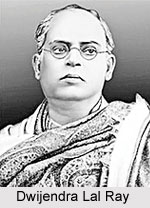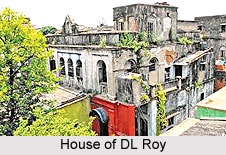 Dwijendra Lal Ray was a noted Bengali musician, poet and playwright who was renowned for his Nationalist historical plays and songs, as well as his plays based on Hindu mythology. His songs, known as `Dwijendrageeti`, or `songs of Dwijendralal` constitute a popular genre of Bengali music. `Banga Amar Janani Amar` and `Dhana Dhanya Pushpa Bhara` are two of his most admired songs. There are over 500 songs composed by him. He is considered to be amongst the most important people who contributed to modern Bengali literature.
Dwijendra Lal Ray was a noted Bengali musician, poet and playwright who was renowned for his Nationalist historical plays and songs, as well as his plays based on Hindu mythology. His songs, known as `Dwijendrageeti`, or `songs of Dwijendralal` constitute a popular genre of Bengali music. `Banga Amar Janani Amar` and `Dhana Dhanya Pushpa Bhara` are two of his most admired songs. There are over 500 songs composed by him. He is considered to be amongst the most important people who contributed to modern Bengali literature.
Early Life of Dwijendra Lal Ray
He was born on 19th July, 1863 in Nadia district, Krishnanagar, West Bengal. He possessed a younger sister and six elder brothers and was born to Kartikeyachandra Ray, the then `Dewan` or Chief Officer of Krishnanagar Palace. He was the seventh child. Dwijendralal Ray`s mother Prasannamayee Devi was a descendant of Advaita Acharya, a well-known Vaishnava ascetic. Ray was said to be an introvert child, who was thoughtful and harboured a great love for nature. He passed the Entrance Examination in the year 1878. In 1880, he successfully cleared the Fine Arts Examination from Krishnanagar Collegiate School. Later, in 1884, he passed B.A. from Hooghly College and finally M.A. in English from the Presidency College in the same year. He received scholarship while he was pursuing his entrance and also during his Fine Arts course. He secured second rank in his M.A. examinations since he was a diligent student. In 1882, a series of songs composed by Dwjendralal Ray were published, which was referred to as `Aryagatha Part I`.
Dwijendralal Ray was offered a scholarship by the state for studying agriculture in England in 1884. He elaborately described his voyage and his observation of his surroundings there, in a weekly journal named `Pataka` which was later published by his brothers by the name of `Bileter Patra` or Letters from England. His parents died while he was in England. Ray published his unique collection of English poems in a book `The Lyrics of Ind` in 1886. He cleared the examination from Cirencester College was then absorbed as a member into the Royal Agricultural Society and the Royal Agricultural College. He returned to his motherland India in the year 1886, after acquiring a diploma in F.R.A.S.
Works of Dwijendra Lal Ray
Immediately after his return from England, Dwijendralal Ray was appointed for the post of a Deputy Magistrate in 1886. He started rendering his services in the Departments of Survey and Settlement, Excise, Land Records and Agriculture, Administration and Judiciary in several portions of the states of Bihar, Bengal and the Central Province. Ray was promoted to the post of First Inspector of the Excise Department in the year 1894 and the Assistant Director, Land Records, and Agricultural Department in 1898, Assistant to the Commissioner, Excise Department in 1900. Later, he again became the Inspector of the Excise Department.

He was transferred to Khulna in 1905. He has also provided service at Gaya, Murshidabad, Kandi and Jahanabad. In 1909, Ray was appointed the Deputy Magistrate of the 24 Parganas. He was once again transferred, this time to Bankura in the year 1912 after which he was posted in Munger within the next three months. It was in Munger that Dwijendralal Ray developed a serious illness due to which he accepted voluntary retirement and thereafter returned back to Kolkata. Some of his applauded songs include `Esho Pran Shakha`, `Amar Bharat`, `Patitadwarini Gangey`, `Banga Amar Janani Amar`, `Aji Gao Maha Geet`, `Je Din Sunil Jaladhi Haite` and others.
`Dhana Dhanya Pushpa Bhara`, the Bengali nationalist anthem created by Dwijendralal Ray in immensely favoured by both the nations of India and Bangladesh. This song was actually considered a probable choice for being chosen as the national song of Bangladesh. The Calcutta Youth Choir performs his songs in their musical concerts, under the direction of Ruma Guha Thakurata. Numerous songs composed by Ray are played regularly on Swadin Bangla Betar Kendra, the radio station which was broadcast to revolutionaries who played an active role in the Bangladesh Liberation War.
Despite of his origin from a Bengali aristocratic family, Dwijendralal Ray was respected for his compassion for peasants. When he was serving for the government, Ray`s ideals were a sharp contrast to that of the Bengal Governor on the issue involving the rights of peasants. Ray then joined the cultural movement, following the Partition of Bengal in order to reunite the new provinces of Bengal. During this time period, Ray wrote many patriotic songs, most of which are quite popular even today. He worked for the upliftment of the social status of women and his opposition against conservative Hindu rituals bears testimony to the fact that he respected women. `Hanshir Gaan` is his famous collection of satires which were aimed at the Hindus belonging to the upper castes.
Some of his mythical plays are `Sita`, `Visma`, `Pasani`, `Banganari` and `Parapore` while his historical plays include `Mebar Patan`, `Tarabai`, `Chandragupta`, `Rana Pratapsingh`, `Nur Jahan` and `Shah jahan`. Most of his dramas were staged in the city of Kolkata and also elsewhere. His historical plays are immensely admired by all and sundry.
Personal Life of Dwijendra Lal Ray
In 1887, Dwijendralal Ray married Surabala Devi, who was the daughter of Pratap Chandra Majumdar, a Homeopath physician. In 1903, his wife Surabala died. Maya Devi and Dilip Kumar Ray were his children.
He died on 17th May, 1913 at the age of 49. He is said to have just commenced editing his journal which was referred to as `Bharatbarsha`.













